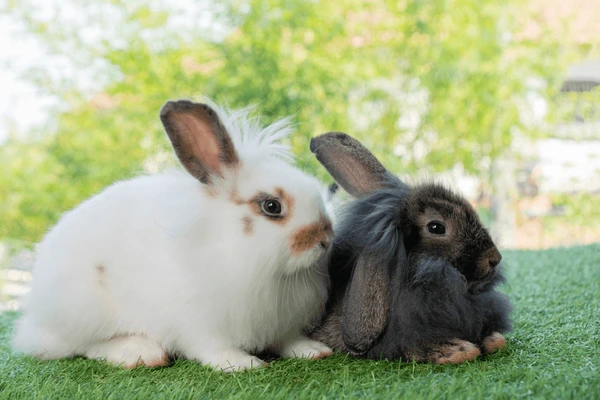Do Rabbits Make Good Pets? Pros, Cons, and Care Tips-2025

Rabbits are among the most popular small pets, admired for their adorable appearance and gentle nature. But do rabbits make good pets for everyone? The answer depends on various factors, including lifestyle, space availability, and commitment level. While rabbits can be affectionate and rewarding companions, they also have specific care requirements that potential owners must understand. This comprehensive guide explores the pros and cons of owning a rabbit and provides essential care tips to ensure your bunny thrives.So let’s briefly discuss that- Do Rabbits Make Good Pets?
Pros of Owning a Rabbit-Do Rabbits Make Good Pets for Everyone?
1. Affectionate and Social
Do rabbits make good pets? Rabbits are social creatures that can form strong bonds with their owners. With patience and regular interaction, they recognize their caregivers and seek out attention. Some ways rabbits express affection include:
- Nudging or licking their owner
- Sitting beside their human for comfort
- Following their owner around the house
- Engaging in playful behaviors such as binkying (joyful jumps and twists)
2. Quiet and Apartment-Friendly
Do rabbits make good pets? Unlike dogs and cats, rabbits do not bark or meow, making them an excellent pet choice for apartment dwellers. Their quiet nature allows for a peaceful living environment, although they do make subtle sounds, such as purring when content or thumping their hind legs when frightened or annoyed.
3. Litter Trainable
One of the many advantages of having a rabbit as a pet is that they can be litter trained. This makes cleaning up after them much easier and allows them to roam safely in designated areas of your home without constant supervision. With a little patience and proper setup, most rabbits will naturally start using a litter box.
4. Intelligent and Trainable
Do rabbits make good pets? Rabbits are surprisingly intelligent and can be taught a variety of commands and tricks. They respond well to positive reinforcement and can learn to:
- Use a litter box
- Come when called
- Navigate through obstacle courses
- Perform tricks like standing on their hind legs or running through tunnels
- Recognize feeding times and routines
5. Long Lifespan
A well-cared-for rabbit can live 8-12 years, sometimes even longer. This makes them a long-term companion for those willing to provide the necessary care. Their longevity means that owners must be prepared for a decade or more of dedicated care.
6. Low Grooming Needs
Do rabbits make good pets? Unlike dogs, rabbits do not need frequent baths. They groom themselves regularly, similar to cats. However, they do require occasional brushing, especially long-haired breeds, to prevent matting. Routine grooming includes:
- Brushing their fur to remove loose hair and prevent hairballs
- Checking and trimming their nails every few weeks
- Monitoring their ears for dirt buildup or signs of infection
7. Environmentally Friendly Pets
Rabbits consume fresh vegetables and hay, contributing to a more sustainable pet ownership experience. Their waste can also be composted, and they require fewer manufactured products than traditional pet foods.
8. Social with Other Rabbits
Rabbits enjoy the company of their own kind. If you’re considering multiple pets, bonded rabbit pairs can provide companionship and keep each other entertained. Shelters and rescues can help with matchmaking to ensure a successful bond between rabbits. A bonded pair can reduce loneliness and provide mutual comfort.
9. Good for Allergy Sufferers
Rabbits produce less dander than cats and dogs, making them a great option for individuals who suffer from mild pet allergies. However, it is always recommended to spend time around rabbits before adopting one to ensure there are no allergic reactions.
10. Adopting a Rabbit Saves a Life
There are thousands of rabbits in shelters looking for loving homes. By adopting, you help give a rabbit a second chance and reduce the demand for pet store rabbits, many of which come from unethical breeding conditions. Additionally, shelter rabbits are often already spayed or neutered, saving you time and veterinary costs.
Cons of Owning a Rabbit
1. Special Dietary Requirements
Do rabbits make good pets? Rabbits require a specific diet to stay healthy:
- Unlimited hay (timothy for adults, alfalfa for young rabbits) for digestion and dental health
- Fresh vegetables daily, including leafy greens and herbs
- Limited pellets to supplement nutrition
- Fresh water always available in a bowl or bottle
- Occasional fruit treats in moderation due to high sugar content
A poor diet can lead to severe health problems, including digestive issues and obesity. Owners must be diligent about providing a balanced and nutritious diet.
2. Space and Housing Needs
Rabbits need more space than many expect. Ideal housing includes:
- A minimum of 8 square feet of enclosure space per rabbit
- Daily access to a rabbit-proofed room for exercise
- Soft flooring to prevent foot injuries
- A safe and quiet environment, away from loud noises or stressors
- Chew-proof enclosures to prevent destruction of household items
3. Veterinary Care and Health Concerns
Rabbits need specialized veterinary care, including:
- Annual checkups to monitor their health
- Spaying or neutering to prevent reproductive diseases and unwanted litters
- Dental exams, as their teeth grow continuously and require monitoring
- Vaccinations and parasite control to prevent common rabbit illnesses
- Regular monitoring for digestive issues, as rabbits are prone to gastrointestinal stasis
Finding a veterinarian who specializes in rabbits can sometimes be challenging and expensive, making proper preventative care essential.
4. Time and Social Interaction
Do rabbits make good pets? Contrary to popular belief, rabbits are not low-maintenance pets. They require daily interaction, mental stimulation, and social engagement. Rabbits that do not receive enough attention may become bored or depressed. Owners should spend time with their rabbits daily, allowing them time to explore, play, and interact.
5. Chewing and Digging Behaviors
Do rabbits make good pets? Rabbits have strong natural instincts to chew and dig. Without proper outlets for these behaviors, they may chew furniture, electrical cords, or carpets. To manage this:
- Provide safe chew toys like untreated wood, hay cubes, or cardboard
- Set up digging boxes filled with shredded paper or soft bedding
- Rabbit-proof the home to prevent damage to valuable household items
Final Thoughts
So, do rabbits make good pets? The answer depends on your dedication and ability to meet their needs. Rabbits are affectionate, intelligent, and fun companions, but they also require commitment and proper care. If you’re ready to provide them with a loving, well-prepared home, a rabbit can be a wonderful, lifelong companion.




